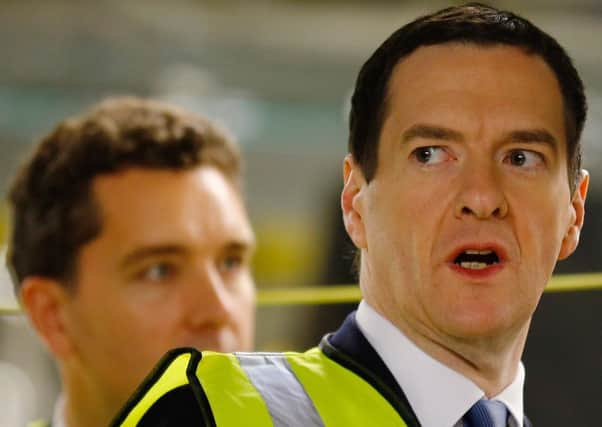George Osborne’s plan hides ‘colossal’ cuts ahead


After George Osborne’s Autumn Statement on Wednesday, the respected economic think tank also said yesterday that voters would be justified in asking whether the Chancellor was planning “a fundamental reimagining of the role of the state”.
While £35 billion of the cuts in spending by Whitehall departments have already been made, the IFS said, £55bn of cuts were yet to come. This is despite claims from coalition ministers this week that the bulk of the UK’s fiscal consolidation following the financial crisis of 2008 had been completed.
Advertisement
Hide AdAdvertisement
Hide AdIFS director Paul Johnson said that if reductions in departmental spending were to continue at the same pace after the May 2015 election as they have done over the past four years, welfare cuts or tax rises worth about £21bn a year would be needed by 2019-20, at a time when the Conservatives are committed to income tax cuts worth £7bn.
“There is no spending dividend on the horizon; far from it,” Mr Johnson said. “There are huge cuts to come.”
He said it would be wrong to describe the cuts as “unachievable” but added: “One thing is for sure. If we move in anything like this direction, whilst continuing to protect health and pensions, the role and shape of the state will have changed beyond recognition.”
He said: “On these plans, whatever way you look at it, we are considerably less than halfway through the cuts.”
Mr Osborne yesterday defended his Autumn Statement measures, insisting voters faced a choice between the “course to prosperity” that he had set out or a return to the “chaos” seen under Labour after the financial crash.
He also insisted it was right to offer an £800 million stamp duty break to home-buyers rather than “pocketing” revenue raised through other reforms.
“I’ve got a plan to reduce the deficit. I’m not going faster than that plan, I’m not going slower than that plan,” he said. “We have demonstrated in specific ways over the past four years that we can reduce the cost of public services while actually improving the quality.”
But Labour shadow chancellor Ed Balls said the £90bn of borrowing now expected this year showed Mr Osborne’s plans were not working, and he promised Labour would make “fairer” choices to increase wages and take the burden off the less wealthy.
Advertisement
Hide AdAdvertisement
Hide AdHe said a key to repairing the country’s finances was supporting wage growth among the lower-paid, which would increase tax revenues.
“Unless we have action to deal with that problem of living standards and wages to make people better off, we are going to have tougher times in the public finances and on public services too,” the shadow chancellor said.
SNP Treasury spokesman Stewart Hosie said: “What we now know is that we have not yet experienced 50 per cent of the cuts but still have 60 per cent more to come.
“This is damning evidence and shows that the Chancellor has completely failed.”
The IFS is the UK’s most respected financial think tank, and its verdicts on the government’s budgets and Autumn Statements are eagerly anticipated.
Mr Johnson described the Autumn Statement’s headline reform of stamp duty on residential property as “welcome but really rather modest”.
He said the more general economic plans implied “a slight increase in the speed of proposed spending cuts after 2015-16”, extending the expected period of reductions in state spending for a further year beyond 2017-18.
To achieve the Office for Budget Responsibility’s forecast of a budget surplus of £23bn by 2019-20 would require “spending cuts on a colossal scale, taking total government spending to its lowest level as a proportion of national income since before the last war”, he said.
Advertisement
Hide AdAdvertisement
Hide AdIf healthcare and state pensions were protected from cuts after the election, as they had been by the coalition so far, then they could be expected to swallow up to one-third of all state spending by 2019-20 – up from a quarter before the crisis.
SEE ALSO
SCOTSMAN TABLET AND IPHONE APPS